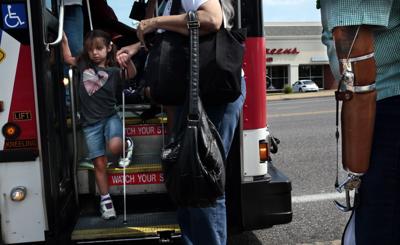ST. LOUIS ÔÇö Metro Transit is sticking with its plan to trim its paratransit van service area next week despite a new complaint disability rights advocates filed Friday with the U.S. Department of Justice.
The complaint alleged that MetroÔÇÖs Call-A-Ride service hasnÔÇÖt met minimum standards set by the federal government, following up a similar protest letter the groups sent last week to the Federal Transit Administration.
ÔÇťWe believe this transit agency has failed to comply with the complementary transit requirements of the Americans With Disabilities Act,ÔÇŁ officials with the organizations said in an email to DOJÔÇÖs civil rights division.
Among those submitting the new complaint were representatives of Paraquad, the Starkloff Disability Institute, Easterseals Midwest, the Down Syndrome Association of Greater Ëú╠Ď╩ËĂÁ and three groups advocating for blind people.
People are also reading…

Salome Cummins, 5, is helped from a Metro bus by Carol Coulter, a National Federation of the Blind volunteer, on Chippewa Street near Hampton Avenue on Wednesday, July 27, 2016. Children attended a braille camp given by the Delta Gamma Center for Children with Visual Impairments, where they learned to handle their own money after taking public transportation to lunch. Photo by Robert Cohen, rcohen@post-dispatch.com
MetroÔÇÖs executive director, Charles Stewart, in an interview repeated his agencyÔÇÖs point that the reduction in Call-A-RideÔÇÖs service area, which begins Monday, is aimed at addressing some of the very issues cited in the two complaints.
ÔÇťShorter trips within the new boundaries (is) improving our efficiency to provide better serviceÔÇŁ to those qualifying, Stewart said.
The change will eliminate service for some areas on the far north, south and west fringes of Ëú╠Ď╩ËĂÁ County beyond Interstate 270. Most of Ëú╠Ď╩ËĂÁ County and Ëú╠Ď╩ËĂÁ will continue to be covered.
Under federal rules, paratransit rides must be provided for trips beginning or ending within three-fourths of a mile of a Metro bus route or MetroLink station when a bus or train is in service.
Although Metro has reduced its regular bus service several times in recent years, it hasnÔÇÖt downsized its Call-A-Ride area accordingly since 2016.
The changes also will bar any trip outside MetroLink or MetroBus service times, even in the reduced coverage area. Stewart said many people affected by that issue have been able to continue to qualify by agreeing to changes in their pickup times.
In the complaints, the disability rights groups say their employees and people they serve have been repeatedly denied Call-A-Ride trips, a situation thatÔÇÖs gotten worse with a shortage of Metro van drivers and other employees in recent years.
They also say Call-A-Ride customers typically have to call three days ahead to book a trip, despite a federal requirement of next-day service. And they say telephone wait times are much too long.
Speaking generally, Stewart said ÔÇťwe are acknowledging that these situations do existÔÇŁ but said they are due partly to the agency overextending itself in recent years to provide rides to and from areas itÔÇÖs not legally required to serve.
Metro has said about 250 regular customers would be affected by the change. In response, Jeanette Mott Oxford, a Paraquad official and a former state legislator, said every Call-A-Ride user will be affected in some way, because they no longer will be able to travel to locations that will now be out of the service area.
Oxford also asked how cutting 250 people off a system can ÔÇťfix a problem that caused 18,000-plus trip denialsÔÇŁ in January.
Oxford says that while MetroÔÇÖs planned cuts to the routes and service times are allowed by the federal rules, the existing violations give the feds a reason to investigate. ÔÇťWeÔÇÖre hoping the scrutiny would lead to improvements,ÔÇŁ she said.
Stewart, the Metro official, said his agency is working to inform users affected by the cuts about other available paratransit services, such as those provided for people who qualify for Medicare. ÔÇťCall-A-Ride was never meant to be the solution for the entire region,ÔÇŁ he said.
The Justice Department did not respond Friday to a request for comment.
In January, the department reached a agreement with the city of Honolulu to take immediate steps to reduce telephone hold times for callers to its paratransit van service.
Late last year, a U.S. attorneyÔÇÖs office got a New Jersey transit agencyÔÇÖs van service to cut telephone hold times, improve the timeliness of pickups and dropoffs and make other improvements.
Another U.S. attorneyÔÇÖs office last October told the to improve its paratransit program.
Jobs outlook: With unemployment in metro Ëú╠Ď╩ËĂÁ at a record low, David Nicklaus and Jim Gallagher explain what has to happen for the region to see further job gains in 2023.












